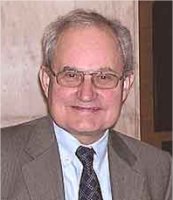
On Tuesday the 1st of May 2012, the Chairman of the RSGB visited Chelmsford to address members of CARS, the Chelmsford Amateur Radio Society. Dr Bob Whelan G3PJT has been an RSGB member for over 50 years, and as Chairman, has strong views on the RSGB’s future and the challenges it faces in the 21st century.
Here is a summary of Dr. Whelan’s talk, and the subsequent questions, from the meeting held at the Marconi Social Club on Tuesday.
RSGB Presentation
After being wlecomed to the club evening by CARS President Carl Thomson G3PEM, Bob ran through a presentation outlining the RSGB’s history. The RSGB started out in 1913 as the London Wireless Club, and today has 20,000 members. 57% of the RSGB’s revenue comes from membership subscriptions, 22% from sales of books, 11% of advertising and 6% from examination fees. The company currently has 16 staff, and the support of several hundred volunteers.
Bob then outlined some of the recent achievements, such as the opening of the NRC (National Radio Centre) at Bletchley Park. (See this site’s National Radio Centre report). Other achievements include the creation of press packs for clubs, the introduction of the payment system for QSL non-members, and the inclusion of FAQs, reports and additional information on the RSGB website. Planned activities include maintaining a good relationship with OfCom, getting amateur radio into the media, reviewing Islands On The Air (IOTA), the introduction of new examination software, plus updates and fixes to the RSGB website.
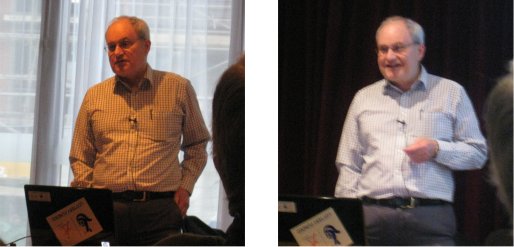
In closing, Bob outlines some of the ways that we could all help, including taking an active part in the consultation process, volunteering to help, and helping to recruit new members to the society. The floor was then opened to questions, a few of which are summarised below.
Questions to the RSGB
Discounts for unemployed or disabled
There appear to be no discounts for unemployed or disabled amateurs. This is something for the RSGB to look into
Compulsory membership to RSGB
Should RSGB membership be compulsory to new members? No. Bob outlined that there are restrictions placed on the RSGB by OfCom about compulsory membership to amateurs passing exams. The observation was made that in Germany, new amateurs have to join DARC, the German equivalent of the RSGB. It appears that the RSGB will not be pushing for any form of compulsory membership.
Emergency Communications and RSGB
Amateur radio can play an important part in communications in cases of disasters and emergencies. RAYNET plays a part and provides support to the emergency services, and they have played roles.
The GB4FUN Bus
Why is one of RSGB’s promotional tools, the GB4FUN bus gathering dust in Milton Keynes, rather than being out on the road raising the awareness of the hobby? When there’s the money, it seems. It costs between £30,000 and £40,000 a year to run. Hopefully this will get back on track in 2013. If RSGB can’t fund the GB4FUN, perhaps smaller ‘promotional packages’ could be considered?
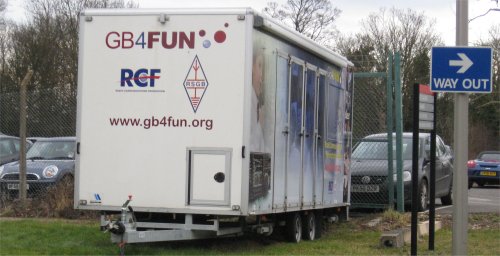
RSGB as a Charity?
The RSGB is not a charity, but the RCF is the RSGB’s charity. There was some discussion as to whether the RSGB should become a charity, but it is not as easy at it seems. It is something that the RSGB has reviewed and remains “on the list”. Lottery funding has been looked into, but this is only appropriate for project funding, and not running costs.
RSGB, Ofcom and Abuse
Most hams have experienced abuse of the amateur bands. Although we’re supposed to be self-policing, how much pressure can RSGB put on Ofcom to start policing the amateur radio bands? Bob’s experiences of OfCom’s complain handling has been positive. We have the Amateur Radio Observation Service, but as amateur radio is not a protected service, Ofcom won’t go out to take action relating to abuse within our spectrum.
It was also observed that cheap and easy availability of amateur radio hardware makes . Aeronautical radio equipment can’t be sold without sight of a license, but that’s not the case for ham radio. Even if UK stores could be encouraged to toughen up, but non-UK eBay purchases would be harder to police.
What does the 21st century ham look like?
It seems that “grey hair, long white beard” is the consensus. Recruitment typically takes place within families, and those with free time and disposable income are targeted. CARS training courses typical age profile is 35+.
Bob believes that the Internet will be a big part of the future, possibly with courses and exams moving online. RF noise will be an increasing issue. Should RADCOM move to e-publishing and become an online magazine (with decent online search facilities)?
More images from the evening
Here are a few more images from the 1st of May 2012. If anyone has any images to contribute, please mail them to “online at essexham dot co dot uk”
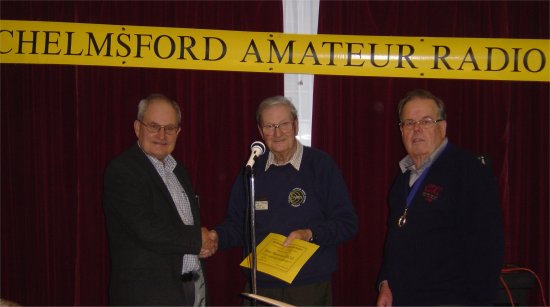
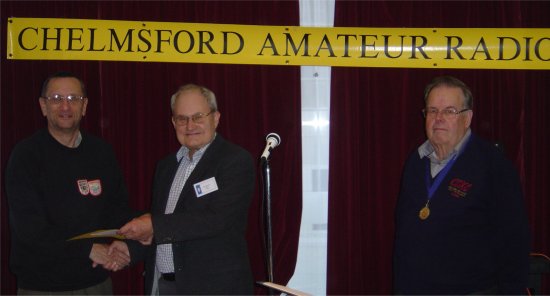
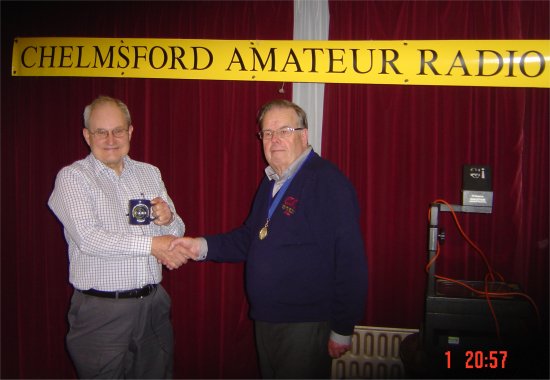
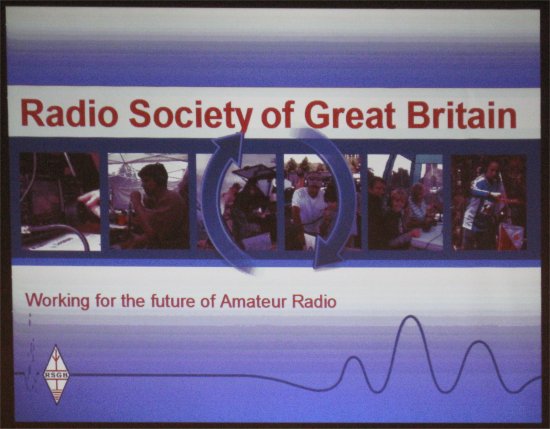
Thanks to Colin Page G0TRM for contributing some of the images from the evening


Peter,
Well done – nice to see everything went well in my absence.
Thanks for doing a “Write-up” – perhaps I could copy it for the CARS Web Site?
John G8DET.
John – See my email to you. No problem with all or any of the above text being used on the CARS site or in the CARS newsletter if it’s of use
Perhaps my english is not good enough to understand the part about the compulsory membership correctly, but there is no compulsory darc membership in germany. There might be courses at a local darc chapter that require membership , but you can access the exam at the “BNetzA” without any membership.
Some people inside the darc might wish a compulsory membership to stop the continous decreasing darc fraction of licensed amateurs (often caused by dissatisfaction about the darc politics).
vy 73, Ulrich